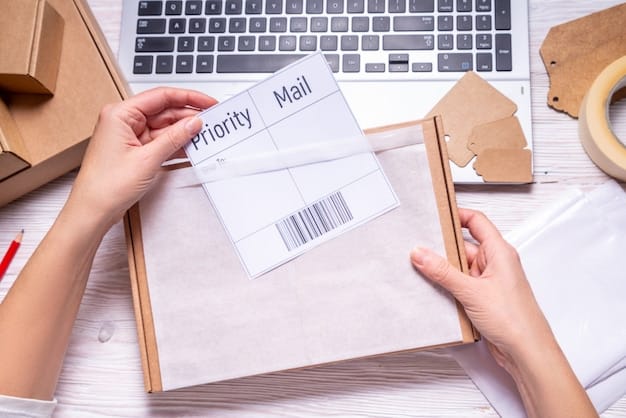Stop Collection Calls: Your Rights Under the FDCPA

Stop collection calls by understanding and exercising your rights under the Fair Debt Collection Practices Act (FDCPA), including requesting validation of the debt and demanding communication cease.
Anúncios
Are you tired of persistent debt collection calls disrupting your life? You have rights! This step-by-step guide will show you how to stop collection calls by leveraging the Fair Debt Collection Practices Act (FDCPA) and reclaiming your peace of mind.
Understanding the Fair Debt Collection Practices Act (FDCPA)
The Fair Debt Collection Practices Act (FDCPA) is a federal law that protects consumers from abusive, deceptive, and unfair debt collection practices. It sets ground rules for debt collectors and outlines your rights when they contact you. Understanding the FDCPA is the first step in taking control and stopping unwanted calls.
What the FDCPA Covers
The FDCPA applies to debt collectors, which are defined as businesses that regularly collect debts for others. This includes collection agencies, lawyers who collect debts, and companies that buy debts and then try to collect them. Note that the FDCPA generally doesn’t apply to original creditors – the companies you originally owed money to.
Key Provisions of the FDCPA
The FDCPA provides numerous protections. Some key provisions include:
- Debt collectors can only contact you at reasonable times (generally between 8 a.m. and 9 p.m.).
- They cannot contact you at inconvenient places, such as your workplace, if they know your employer disapproves.
- Debt collectors cannot harass, oppress, or abuse you or any third parties they contact. This includes using threats, obscene language, or repeatedly calling.
- They must identify themselves as debt collectors and provide certain information about the debt, including the name of the creditor, the amount of the debt, and your right to verification.
Who is Not Covered by the FDCPA
It’s important to know the FDCPA primarily targets third-party debt collectors. The original creditor, such as the bank you have a credit card with or the store where you opened a credit line, is generally NOT covered by the FDCPA. However, they are often subject to other state and federal laws regarding fair business practices.
In conclusion, understanding the FDCPA’s scope is essential. It protects you from abusive third-party debt collection practices, but its coverage has limitations regarding original creditors.
Step 1: Know Your Rights
Knowing your rights under the FDCPA is crucial. This empowers you to assert yourself and take action against debt collectors who violate the law. Here’s a breakdown of key rights to keep in mind.
Right to Validation of the Debt
You have the right to request validation of the debt. This means the debt collector must provide you with information proving you owe the debt. They need to send you:
- The amount of the debt
- The name of the creditor
- A statement that if you request it within 30 days, they will provide verification of the debt
- A statement that if you request it within 30 days, they will provide the name and address of the original creditor, if different from the current creditor
Right to Cease Communication
You have the right to tell a debt collector to stop contacting you. This is a powerful tool for stopping collection calls. To exercise this right, you must send the debt collector a written notice requesting them to cease communication. Once they receive this notice, they can only contact you to acknowledge your request or to inform you about a specific action they intend to take, such as filing a lawsuit.
Right to Dispute the Debt
Even if you owe some money, you have the right to dispute the debt if you believe it is inaccurate, not yours, or not owed in the amount claimed. Dispute the debt in writing, providing as much detail as possible about why you believe the debt is invalid.
Knowing your rights is your first line of defense. Use these rights to protect yourself from harassment and ensure debt collectors follow the rules.
Step 2: Keep a Detailed Record of Communication
Maintaining a detailed record of every interaction with debt collectors can be extremely beneficial if you need to dispute the debt, file a complaint, or take legal action. Document everything!
Why Keep Records?
Detailed records can serve as evidence to support your claims if a debt collector violates the FDCPA. This is crucial for demonstrating how often they called, the content of the conversations, and any threats or abusive language they used. Moreover, thorough records assist you in tracking the debt collection process and help ensure that you have a clear picture of the situation.
What Should You Record?
Keep track of the following information for each call or communication:
- Date and time of each call
- Name of the debt collector
- Company the debt collector represents
- Phone number used by the debt collector
- Summary of the conversation, including any threats, abusive language, or misrepresentations
- Copies of any letters or emails exchanged
How to Organize Your Records
Keeping your records organized is important. One approach is to use a spreadsheet or create a digital document where you can log each communication. You can also maintain a physical folder where you store copies of letters and notes from each call. Choose a method that works best for you and stick with it consistently.
Maintaining comprehensive records is a key step in protecting your rights and managing debt collection interactions effectively.
Step 3: Send a “Cease Communication” Letter
One of your most powerful rights under the FDCPA is the ability to tell a debt collector to stop contacting you. Sending a “cease communication” letter is a crucial step in stopping collection calls. This letter, when correctly delivered, instructs the debt collector to only contact you under certain limited circumstances, such as to notify you of a looming lawsuit.
Drafting Your Cease Communication Letter
Your letter should clearly state that you are requesting that the debt collector cease all communication with you. Include the following information in your letter:
- Your full name and address
- The debt collector’s name and address
- The account number associated with the debt
- A statement that you are requesting them to cease all communication, except to acknowledge your request or to notify you of a specific action (like a lawsuit)
Sending the Letter
It’s important to send the letter via certified mail with a return receipt requested. This provides you with proof that the debt collector received your request. Keep a copy of the letter and the return receipt for your records.
What Happens After You Send the Letter?
Once the debt collector receives your cease communication letter, they must stop contacting you, except to acknowledge your request or inform you of a specific action they intend to take. If they continue to call you after receiving the letter, they are violating the FDCPA, and you may have grounds for legal action.
Sending a cease communication letter is a powerful way to stop debt collection calls and assert your rights under the FDCPA. Make sure to follow the correct procedure to ensure your request is properly delivered and documented.
Step 4: Request Debt Validation
Even if you think you owe the debt, requesting debt validation is a critical step. This forces the debt collector to prove that the debt is valid and that they have the legal right to collect it. If they cannot validate the debt, they must cease collection efforts.
How to Request Debt Validation
To request debt validation, send a written request to the debt collector within 30 days of their initial communication. Your request should include:
- Your full name and address
- The debt collector’s name and address
- The account number associated with the debt
- A clear statement that you are requesting validation of the debt
- A request for documentation proving you owe the debt
What Documentation Should You Expect?
The debt collector should provide you with documentation such as:
- A copy of the original credit agreement or contract
- Statements showing the history of the account
- Documentation showing they have the right to collect the debt
What If They Can’t Validate the Debt?
If the debt collector cannot provide sufficient documentation to validate the debt, they must stop collection efforts. If they continue to pursue the debt despite their inability to validate it, they are violating the FDCPA, and you may consider further action.
Requesting debt validation is a vital step in confirming the legitimacy of the debt and ensuring that debt collectors comply with the FDCPA. This process can protect you from paying invalid or unsubstantiated debts.
Step 5: File a Complaint if Necessary
If a debt collector violates the FDCPA, you have the right to file a complaint with regulatory agencies. Filing a complaint can help hold debt collectors accountable and may lead to investigations and penalties.
Where to File a Complaint
You can file complaints with the following agencies:
- The Consumer Financial Protection Bureau (CFPB)
- The Federal Trade Commission (FTC)
- Your state’s attorney general office
What Information Should You Include?
When filing a complaint, provide as much detail as possible, including:
- Your full name and contact information
- The debt collector’s name and contact information
- A clear description of the FDCPA violation
- Dates and times of the violations
- Copies of any letters or other documentation supporting your complaint
What occurs after filing a complaint depends on the agency, but the CFPB and FTC use these complaints to track trends and take action against companies flouting the law. This can include investigations, fines, and orders to change business practices.
Filing a complaint is an important action to take when debt collectors violate your rights. It helps protect you and other consumers from abusive and unlawful debt collection practices.
Step 6: Seek Legal Advice
If you have experienced significant harassment or violations of the FDCPA, seeking legal advice is often a prudent step. An attorney specializing in consumer protection law can assess your situation, advise you on your legal options, and represent you in negotiations or litigation.
When to Consult an Attorney
Consider seeking legal advice in the following situations:
- The debt collector continues to harass you after you’ve sent a cease communication letter.
- The debt collector threatens or uses abusive language towards you.
- The debt collector sues you for the debt.
- You believe the debt collector has violated the FDCPA and you want to take legal action.
The FDCPA allows you to sue debt collectors who violate the law. You can recover damages, including actual damages (such as emotional distress) and statutory damages (up to $1,000). The debt collector may also be required to pay your attorney’s fees and court costs.
Finding an Attorney
To find an attorney, you can use online resources such as the National Association of Consumer Advocates (NACA) or your local bar association. Look for an attorney with experience in consumer protection law and the FDCPA.
Consulting an attorney can provide you with insights, protect your rights, and seek recourse against debt collectors that violate the law.
| Key Point | Brief Description |
|---|---|
| ✋ Cease Communication | Send a written request to stop debt collector contact. |
| 🧾 Debt Validation | Request proof from the debt collector that the debt is valid. |
| 😠 FDCPA Violations | File a complaint with CFPB or seek legal advice for violations. |
| 📝 Record Keeping | Maintain detailed records of communications for evidence. |
Frequently Asked Questions (FAQs)
▼
The FDCPA is a federal law that protects consumers from abusive, unfair, and deceptive debt collection practices by debt collectors. It sets limits on how and when they can contact you.
▼
You can send a written “cease communication” letter to the debt collector, instructing them to stop contacting you except to acknowledge receipt of the request of to inform you of specific actions, for example, filing a lawsuit.
▼
Keep detailed records of the violations, file a complaint with the Consumer Financial Protection Bureau (CFPB) or your state attorney general, and consider seeking legal advice for further action.
▼
Debt validation is requesting written proof from the debt collector that the debt is valid. Send a written request within 30 days of their initial contact, asking for documentation like the original agreement.
▼
Yes, you can sue a debt collector who violates the FDCPA. You may be entitled to recover damages, attorney’s fees, and court costs. Consulting with a consumer protection attorney is advisable.
Conclusion
Navigating debt collection can be stressful, but understanding and exercising your rights under the Fair Debt Collection Practices Act (FDCPA) is essential for regaining control. By knowing your rights, documenting communications, and taking appropriate action, you can effectively stop collection calls and ensure fair treatment.







